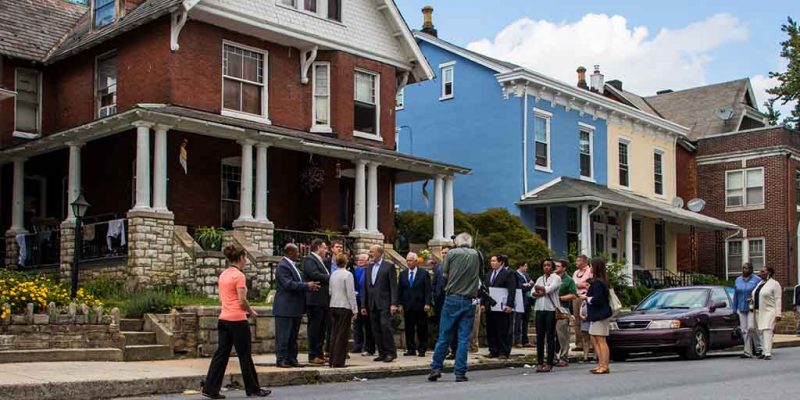HARRISBURG – Gov. Tom Wolf yesterday signed two bills aimed at eradicating blight throughout Pennsylvania’s communities.
House Bill 653 and Senate Bill 667 will help municipalities by providing new tools to help increase redevelopment opportunities statewide.
“My administration is committed to addressing blight and we have invested in community redevelopment that enhances that goal,” said Wolf.
“These bills are important to help local communities more swiftly address blight and I commend the bipartisan Blight Task Force for its continued dedication to this important cause.”
House Bill 653 provides for an accelerated foreclosure process for vacant and abandoned property, while maintaining appropriate protections for property owners.
Blighted properties continue to be a major problem for boroughs, townships and cities. Local officials say that many properties in foreclosure are abandoned.
These properties often become dangerous eyesores that reduce the property values of taxpaying homeowners in the neighborhood.
Studies show that these properties also become prime locations for increased criminal activity, thereby reducing public safety.
The foreclosure process in Pennsylvania currently can last from 300 to 540 days. This bill is expected to reduce the timeframe for foreclosure on abandoned and vacant property by 240 days.
This bill is the culmination of four years of work by the bicameral, bipartisan Blight Task Force.
Since 2009, eight states have enacted expedited foreclosure laws as a way to help local governments and responsible taxpayers maintain and rebuild their communities.
Senate Bill 667 will grant redevelopment authorities the same powers currently allotted to land banks to increase opportunities to combat neighborhood blight.
The legislation will allow established redevelopment authorities to get into the fight against blight, saving time and money.
A land bank is an independent public entity created by a municipality to expedite the process of acquiring and rehabilitating blighted, dilapidated, and abandoned properties. In many instances, land banks and redevelopment authorities work in unison to eliminate blight in communities.
While land banks have been crucial in this fight, many of the commonwealth’s counties have active redevelopment authorities, which have been performing similar functions for decades.
Granting Redevelopment Authorities the same powers allotted to land banks through the Pennsylvania Land Bank Act will allow them to acquire tax delinquent properties at a judicial sale through a more streamlined process.
It will also eliminate the need to form an entirely new entity in these municipalities, which can be redundant and divert resources which could be dedicated to eradicating blight and promoting redevelopment.
